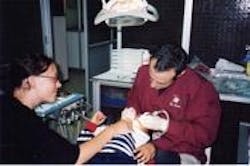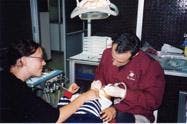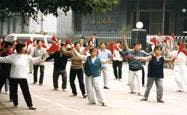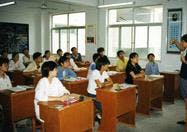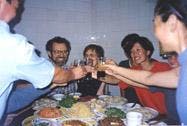Exchanging Ideas on Education, Life and Floss
The first thing we learned in China is that flossing teeth brings loud guffaws from otherwise mannerly Chinese. "String in your teeth? We don't do that here," said a guide, trying unsuccessfully to stifle a laugh.
A few weeks later, when we discovered we were short of floss, we learned that the only place to buy it (at an exorbitant cost) is in the gift shops of fancy hotel that cater to Westerners.
It seems that American and Chinese dentists need to exchange ideas—and now there's a way to do so. Global Volunteers, a private, nonprofit, nonsectarian organization based in Minnesota, has groups in Ecuador, Jamaica, India and China who welcome American dentists. "In Jamaica the dentists will work in a rural area, while in Ecuador they will work at Camp Hope, a facility for vulnerable children, " says Barb DeGroot, media relations manager for Global Volunteers. "In China dentists aren't involved in direct patient care, but it's possible to arrange visits to Chinese dental facilities and conversations with Chinese colleagues."
Of course, for dentists who want a vacation from molars and mouth mirrors, Global Volunteers has a non-dental programs in twenty countries, including the United States, where it partners with people in economically developing rural communities. Volunteers spend one to three weeks teaching English, building roads and houses and—most importantly—building lasting friendships with people whose lives are very different from their own.
We traveled to China several years ago to teach English to junior and senior high school students. It was an experience we'll never forget.
"Bung jee la, it's great!" Liu Hua's eyes sparkled as she wrote the Chinese characters. "I show you Chinese, okay?"
"Very okay," we said, realizing that our students had decided that language instruction was going to flow both ways. But during our three-week stay sixteen-year-old Hua (in China the family name, Liu, precedes the given name) and her friends taught us much more than a smattering of Chinese. Through our conversations filled with pantomime and punctuated by laughter they gave us an insight into China that could never be seen from tour-bus windows.
Our volunteer team of seventeen people, ranging in age from twenty-two to eighty-one, was based in Xi'an, a mid-sized city in the agricultural heart of China. We were housed in a three-star hotel, not as luxurious as China's marble-laden five-star accommodations but every bit as nice as most Holiday Inns or Marriotts. Every morning we were awakened at 6:00 by Chinese reveille. We looked out our fourteenth-floor window and watched as approximately one hundred men and women began their day with tai-chi and fan-dance routines.
After a multi-cultural breakfast consisting of spicy stir-fry for the adventurous and eggs for the timid, our driver drove us to our school. We held our breath as he zigged and zagged around bicycles and pedestrians, ignoring road lanes and, often, heading straight into on-coming traffic. "Driving is the Chinese method of population control," said our driver.
Our school was new and still quite small, holding only 257 preteens and teens, who were divided into ten classes. Parents paid approximately $1,000 a year tuition, which covered not only instruction but also room and board five days a week. Students (and teachers, who doubled as counselors) lived in spartan dormitories.
Most days the teachers asked us to read specified paragraphs of text. We listened as the students repeated our words in loud and messy unison and then we corrected their pronunciation. Group recitation is, they insisted, "the Chinese way," used in Chinese literature as well as English language classes. "After you teach the Chinese way, you can play games so they can learn the American way," the classroom teacher said.
I opened the text. "Charlie Chaplin was born in..." A student sneezed. "Bless you," I said. "Charlie Chaplin was born in Bless You," thirty-five voices said loudly.
While the students began class at 7:15, after breakfast and morning exercise, we weren't expected to arrive until 8:30. We taught three classes in the morning and one in the afternoon and were back at the hotel by 4:00. The students' day was considerably longer. They had classes until dinner and then went to study halls until nine or ten o'clock (depending on the students' age).
By comparison, our schedule was relaxing. We generally worked on lesson plans until dinner, after which we shared experiences with teammates or took walks around the hotel. Toddlers—usually barefooted and always bare-bottomed—played with tiny trikes and cars, which were left on the sidewalk for communal use. One battery-powered child-car blared endless repetitions of "Santa Claus is Coming to Town," and "We Wish You a Merry Christmas." No matter that it was only September; these melodies play year-round, we were told.
Weekends we explored the city beyond the hotel. Xi'an, the capital of China for nearly 1200 years, was the largest city in the world during the Tang dynasty (618-907 AD). Its streets were clogged with traders dealing in fine horses and exotic jewels.
But due to corruption and carousing by some of the emperors, it declined into a rather ordinary town, rarely visited by tourists despite its walled city which is laid out in the classic Chinese style, several interesting towers, pagodas and a Great Mosque near the city's large Muslim Quarter.
Then in 1974 peasants who were digging a well came upon the tomb of Qin Shihuang, the first emperor of a United China who ruled from 221-210 BC. The 8,000-plus life-size terracotta soldiers who were supposed to "protect" the tomb are among the world's great archeological treasures, Xi'an suddenly became a major tourist center and now has more five-star hotels than any Chinese city except Beijing and Shanghai.
But while we were fascinated by Xi'an's sights and learned to negotiate the city by bus, taxi and foot, our most memorable weekend moments were those spent with our students. Chen Meng, whose father managed a construction company, invited us to her home for dinner. Along with her mother, three girlfriends (including Liu Hua), and four of their teachers, Meng taught us to make dumplings, a holiday treat.
At other homes we feasted on sweet-and-sour pork, homemade noodles in beef broth, and a nine-dish assortment of artfully arranged vegetables. We were offered spoons, but fortunately we were adept with chopsticks.
On our last day Liu Hua wanted to practice American slang. "No problem," we said. .
"Then," she smiled, "it's a plan."
"Like, whatever," added Chen Meng.
And so it went, until it was time to say "So long." But we couldn't bring ourselves to bid our students good-bye. Instead, we said, "Bung jee la. It was great!"
For more information: contact Global Volunteers. Phone: 800/398-8787; E-mail: [email protected];
Website: www.globalvolunteers.org
Photos of dentists Dr.Gary Seiden (in Ecuador) and Dr. Lewis Pierce (in the Cook Islands) are the property of Global Volunteers.
